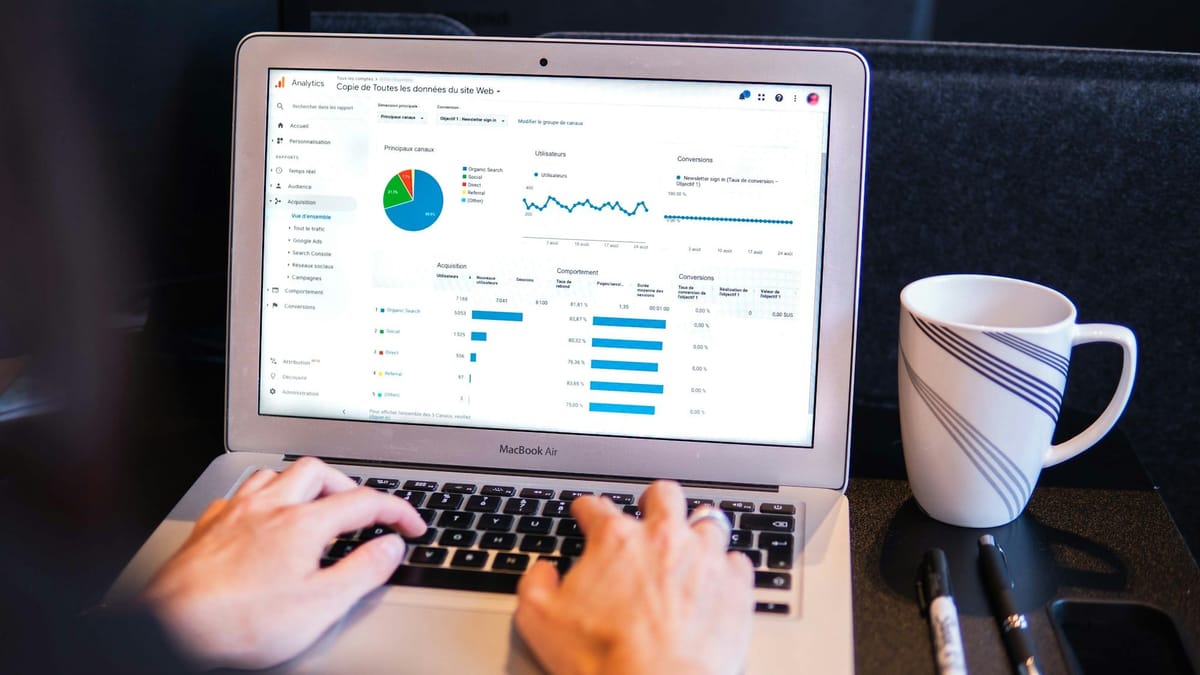Using Analytics to Fuel Your Growth Engine

Data is at the heart of every successful business today. The ability to collect, analyze and derive insights from data has become a crucial competitive advantage for companies across all industries.
In fact, a study by McKinsey found that companies that leverage data-driven decision making are 23 times more likely to acquire customers, 6 times more likely to retain customers, and 19 times more likely to be profitable as a result. 😮
Imagine navigating a bustling marketplace blindfolded. Every decision – where to set up shop, what products to offer, how to reach customers – is shrouded in uncertainty. This, unfortunately, represents the reality for businesses that fail to harness the power of data.
In today's information age, data isn't just a passive collection of numbers; it's the illuminator that cuts through the fog, guiding businesses towards strategic decision-making and explosive growth.

Growth Hacking Services
A complete data-driven growth marketing team working on your digital platform or e-commerce project goals. We cover the full AAARRR funnel stages to increment ROI, keep high LTV and decrease CAC.
The ability to gather, analyze, and extract actionable insights from data has become the defining factor in the race for competitive advantage. Across industries, from established titans to agile startups, businesses that leverage the power of data analytics are rewriting the rules of success.
This article delves into the transformative potential of data analytics, exploring how it empowers businesses to unlock a deeper understanding of their customers, anticipate market shifts, and optimize internal operations. By becoming data-driven, businesses transform from operating blindfolded to hitting the bullseye with every strategic move, securing a sustainable path to prosperity.
Utilizing Analytics to Drive Growth
One of the key ways that businesses can harness the power of data is through analytics. By using advanced analytics tools and techniques, businesses can gain valuable insights into customer behavior, market trends, and operational efficiency.
For example, a report by Forrester Research found that companies that invest in analytics are able to increase their sales by an average of 5-10%.
In today's data-driven world, information is a powerful asset. But simply having a lot of data isn't enough. The true magic lies in data analytics, the process of extracting meaningful insights from all that information. Imagine you have a treasure chest overflowing with gems, but they're all buried in dirt and clutter. Data analytics is like the sifting tool that helps you uncover the valuable gems and sort them by size, color, and quality.
By using advanced analytics tools and techniques, businesses can turn their raw data into actionable insights that can improve their performance in several ways:
- Understanding Customer Behavior: Analytics can help you understand your customer demographics, their buying habits, what products they browse together, and even their online behavior patterns. This allows you to personalize your marketing messages, product recommendations, and overall customer experience, leading to higher satisfaction and sales.
- Identifying Market Trends: Data analytics can analyze vast amounts of market data to uncover trends before your competitors. Are there seasonal shifts in demand? Is a new technology emerging that could disrupt your industry? By spotting these trends early, you can adapt your strategies and potentially gain a competitive edge.
- Optimizing Operations: Analytics can be used to assess every step of your business operations, from production and inventory management to logistics and delivery. By identifying bottlenecks and inefficiencies, you can streamline processes, reduce costs, and improve overall efficiency.
The Forrester Research report you mentioned highlights the significant impact of data analytics on sales. When businesses can use data to understand their customers better and tailor their offerings accordingly, it naturally leads to increased sales and customer loyalty. Think of it as a win-win situation: you provide solutions that resonate with your customers' needs, and they reward you with their business.
The Role of Machine Learning in Data-Driven Decision Making
Machine learning is a subset of artificial intelligence that enables computers to learn from data without being explicitly programmed. By using machine learning algorithms, businesses can uncover hidden patterns and trends in data that can lead to more informed decision making.
According to a report by Gartner, 40% of enterprises are planning to deploy machine learning within the next year to improve their business operations.

Growth Hacking Services
A complete data-driven growth marketing team working on your digital platform or e-commerce project goals. We cover the full AAARRR funnel stages to increment ROI, keep high LTV and decrease CAC.
Measuring Success with Key Performance Indicators (KPIs)
Key Performance Indicators (KPIs) are metrics that businesses use to track and measure their progress towards specific goals. By establishing KPIs that are aligned with business objectives, companies can track their performance and make data-driven decisions to drive growth. A study by Harvard Business Review found that companies that align their KPIs with their strategic objectives are 42% more likely to achieve strong financial performance.
Imagine driving a car blindfolded. You might be going somewhere, but it would be difficult (and dangerous!) to know how fast you're going, if you're on the right track, or how much gas you have left. In business, Key Performance Indicators (KPIs) are like the dashboard of your car. They provide the crucial metrics you need to track progress, identify areas for improvement, and ultimately reach your destination (your business goals).
KPIs are quantifiable measurements that businesses use to gauge their success towards specific objectives. Let's say a company wants to increase brand awareness. A relevant KPI could be "social media engagement" (likes, comments, shares on their posts). By monitoring this KPI, the company can see if their social media strategy is working and make adjustments if needed.
Here are some other examples of KPIs across different business areas:
- Sales: Number of new customers acquired, conversion rate (percentage of website visitors who make a purchase)
- Marketing: Website traffic, cost per lead (amount spent to acquire a new customer)
- Customer Service: Customer satisfaction score, average response time to inquiries
- Finance: Revenue growth, profit margin (percentage of profit from each dollar of sales)
The key takeaway from the Harvard Business Review study is this: When a company's KPIs are directly tied to its overall strategic goals, everyone in the organization is working towards the same thing. This alignment leads to better decision-making, improved performance, and ultimately, a higher chance of achieving strong financial results. In simpler terms, if you know what you're aiming for (strategic objectives) and have a way to measure your progress (KPIs), you're much more likely to succeed.

Growth Hacking Services
A complete data-driven growth marketing team working on your digital platform or e-commerce project goals. We cover the full AAARRR funnel stages to increment ROI, keep high LTV and decrease CAC.
The Importance of Data Quality and Governance
It's important for businesses to ensure that the data they collect is accurate, reliable, and up-to-date. By implementing strong data quality and governance measures, companies can trust the data they are using to make decisions and drive growth. According to a report by Experian, poor data quality costs US businesses an estimated $3.1 trillion per year.
Conclusion
As businesses continue to navigate an increasingly data-driven world, the ability to leverage analytics to fuel growth has become essential. By making data-driven decisions based on insights derived from analytics, companies can gain a competitive edge and drive success.
4Geeks is an expert and trusted partner in helping businesses harness the power of data to achieve their growth objectives.
FAQs
How can I get started with data analytics if my business is small and doesn't have a lot of data?
Even a small business can benefit from data analytics! There are many free and affordable tools available to help you get started. You can track website traffic with Google Analytics, conduct customer surveys with free online tools, and collect sales data from your point-of-sale system. The key is to identify the data that is most relevant to your business goals and start tracking it consistently. Even with a small amount of data, you can start to identify trends and patterns that can inform your decision-making.
What specific analytics tools are recommended for businesses?
The best analytics tools for your business will depend on your specific needs and budget. However, some popular options include Google Analytics (free for basic use), Mixpanel (freemium plan available), and Crazy Egg (freemium plan available). These tools can help you track website traffic, user behavior, and marketing campaign performance. There are also many industry-specific analytics tools available, so be sure to do some research to find the ones that are right for your business.
How can I ensure that I'm using data analytics ethically and responsibly?
Data analytics is a powerful tool, but it's important to use it ethically and responsibly. Be transparent with your customers about how you are collecting and using their data. Only collect data that is necessary for your business purposes. Make sure that your data security practices are up-to-date. Be mindful of the potential for bias in your data analysis.





